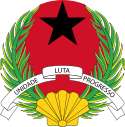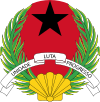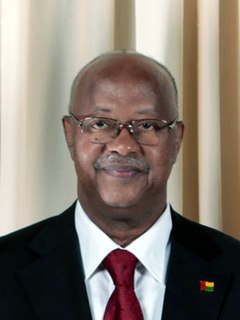| Prime Minister of the Republic of Guinea-Bissau | |
|---|---|
 | |
| Appointer | José Mário Vaz, as President of Guinea-Bissau |
| Inaugural holder | Francisco Mendes |
| Formation | 24 September 1973 |
The following is a list of Prime ministers of Guinea-Bissau , since the establishment of the office of Prime Minister in 1973.

A prime minister is the head of a cabinet and the leader of the ministers in the executive branch of government, often in a parliamentary or semi-presidential system. A prime minister is not a head of state or chief executive officer of their respective nation, rather they are a head of government, serving typically under a monarch in a hybrid of aristocratic and democratic government forms.

Guinea-Bissau, officially the Republic of Guinea-Bissau, is a country in West Africa that covers 36,125 square kilometres (13,948 sq mi) with an estimated population of 1,815,698.
Contents
Since Guinea-Bissau's declaration of independence from Portugal on 24 September 1974, there have been nineteen Prime Ministers and two Acting Prime Ministers. The current holder of the office is Aristides Gomes of the PRID party, who was appointed by a decree of President José Mário Vaz on 16 April 2018.

Portugal, officially the Portuguese Republic, is a country located mostly on the Iberian Peninsula in southwestern Europe. It is the westernmost sovereign state of mainland Europe, being bordered to the west and south by the Atlantic Ocean and to the north and east by Spain. Its territory also includes the Atlantic archipelagos of the Azores and Madeira, both autonomous regions with their own regional governments.
Aristides Gomes is the Prime Minister of Guinea-Bissau, appointed in April 2018, and also previously served as Prime Minister from 2 November 2005 to 13 April 2007. He has subsequently served as President of the Republican Party for Independence and Development (PRID).

The Republican Party for Independence and Development is a political party in Guinea-Bissau led by António Afonso Té.











